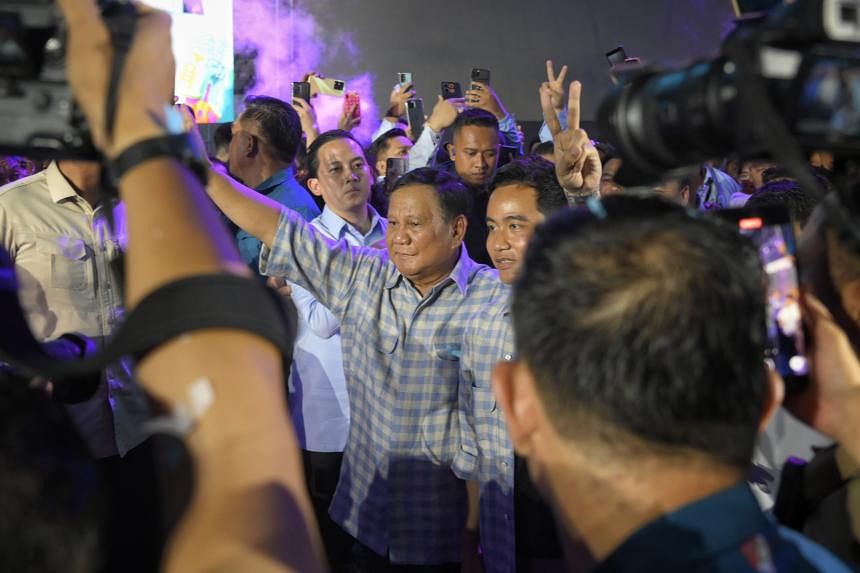KUALA LUMPUR – Indonesian Defence Minister Prabowo Subianto’s ascension to the presidency could see Asean’s largest member reclaim a leading role in the regional bloc after the Joko Widodo years, during which foreign policy was low on the list of priorities, observers say.
Although the “Jokowi effect” of the charismatic Mr Widodo – the first president not to hail from the country’s military or political elite – gained him wide global recognition, he largely left foreign affairs to members of his administration, stepping up only recently when Indonesia chaired the Group of 20 in 2022 and Asean in 2023.
Analysts expect Mr Prabowo, a former general with deep links to neighbours and superpowers farther afield, to take a more active personal role in diplomacy, especially after campaigning on an “Indonesia First” pledge to ensure that the interests of the country’s 280 million citizens are not undermined by foreign powers.
“As defence minister, Prabowo was known for advocating a more balanced foreign policy and seeking partnerships with multiple nations, including Asian powers. As a presidential candidate, he cited the need for strong maritime defence capacity to maintain Indonesia’s interests,” Mr Leigh Howard, chief executive of consultancy Asialink Business in Melbourne, told The Straits Times.
South-east Asian policymakers may also be comforted by Mr Prabowo’s commitment to continuity – signified by having Mr Widodo’s son as his running mate in the election – with a stable and prosperous Indonesia being seen in diplomatic circles as a boon for all.
But some also see potential for Indonesia to drive strongly towards Asean centrality, and focus more closely on the South-east Asian bloc’s longstanding issues, such as disputes with China on overlapping territorial claims in the South China Sea and the humanitarian crisis under Myanmar’s junta.
Mr Andreyka Natalegawa, an associate fellow at the Washington-based Centre for Strategic and International Studies (CSIS), said: “The fact that the Jokowi administration has largely shied away from Indonesia’s traditional role as a leader in Asean has exacerbated the organisation’s strategic drift.
“Prabowo thus has the opportunity to steer Indonesia towards a more forward-leaning and active role in Asean, and restore the institution’s relevance and centrality. But all this depends on whether he has the patience to work through Asean’s admittedly languid decision-making and institutional processes.”
He added that “Prabowo may place a higher priority on maritime security and the assertion of Indonesia’s rights in the South China Sea, including by supporting some efforts at coordination among South-east Asian claimants”.
This would build on ground laid by President Widodo during a visit to Manila in January, when he and his Filipino counterpart Ferdinand Marcos Jr agreed to beef up defence ties and existing pacts on border cooperation after “fruitful” discussions on the South China Sea and cooperation within Asean.
Mr Howard also pointed out that Mr Prabowo’s leadership role in Asean and globally will hinge on his ability to build consensus with his peers in the region, his priorities on international issues, and the foreign policy team he installs in government.
Thus, a key watch point will be the composition of the Prabowo Cabinet, and which of the existing foreign affairs officials will be retained.
A top diplomat noted that Foreign Minister Retno Marsudi had been “very active” in Mr Widodo’s stead, and said “Indonesia was sometimes a bit too pushy” – in stark contrast to the perception that foreign policy was not a top priority of the President.
Ms Retno oversaw over 60 engagements related to the Myanmar crisis in the first half of 2023 alone, as part of Indonesia’s “non-megaphone diplomacy” during its Asean chairmanship.
But while her energy is noted in the diplomatic corps, her “values-oriented approach that sidelined the junta... hasn’t been effective in convincing Myanmar’s military to be more open to foreign observers nor to a more benign political regime”, Vriens & Partners’ Indonesia country director Donna Priadi told ST.
Perhaps a stronger indicator of Jakarta’s leanings will be whether Coordinating Minister for Maritime and Investment Affairs Luhut Panjaitan will continue in his “problem-solver” role. He has served as Mr Widodo’s point man on key issues such as the procurement of Covid-19 vaccines and pandemic recovery, securing investment for the proposed new capital Nusantara in the jungles of Kalimantan, and managing relations with both Washington and Beijing amid rising Chinese investment.
Much will also depend on how Mr Prabowo balances Indonesia’s interests against those of Asean as a whole.
Mr Howard noted that “reclaiming Indonesia’s lead role in Asean would be a useful vehicle for enhancing Prabowo’s foreign policy profile. However, he may also determine that Indonesia possesses sufficient weight to achieve this objective independently”.


